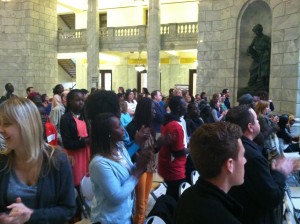SALT LAKE CITY — Surrounded by throngs of culturally diverse Utah residents inside the Capitol rotunda in late March, Stefanie Shumaker set up her wares and carefully arranged her unique display of hand-sewn purses, messenger bags, doll clothes, scarves and a few rock-climbing chalk bags.
To those passing by, she shared her story of how her life in a very small, very white town in South Dakota, a few sewing lessons from grandma, and one wonderful Ethiopian refugee all collided to change her life forever.
Four years ago, Shumaker started a business called Ambatana Threads, a company created for the sole purpose of giving refugees the opportunity use their skills and get paid a fair wage for their work.
“I should pay them the same as I would pay an American seamstress,” Shumaker said as she finshed laying out an impressive array of colorful and well-made products.
Shumaker is a prime example of a thriving group of human rights activists in Salt Lake City. It’s a community of people and organizations that have banded together to make life better for refugees in Utah.
During the past 26 years, nearly 50,000 refugees have been welcomed into Utah from 25 different countries. While these refugees may have escaped persecution in their countries of origin, many still face difficult circumstances here in Utah, especially when it comes to getting a good education.
The Utah Office of Multicultural Affairs and the English Skills Learning Center teamed up to create Global Community Summit, a three-day forum to create awareness of challenges facing Utah’s own diverse local community and opportunities for citizens to participate in generating educational opportunities for their refugee neighbors.

Addressing attendees at the summit, Salt Lake County mayor Ben McAdams said that, as a community, “Our acceptance of refugees is one of our greatest strengths.” He continued by emphasizing that “education is the great equalizer” and urged Utahns to continue contributing to their community.
But the most anticipated guest of the night was human rights activist and hip-hop artist Emmanuel Jal. Jal’s South Sudanese roots connected him to many in the audience as he related his story of carrying around an AK-47 assault rifle as a nine-year-old child soldier in Sudan and being “forced to sin.”
“Peace is when my belly is full,” Jal said. And it was that message of peace that he used to raise the audience to its feet to sing and dance with him.
The meeting ended, leaving the hundreds in attendance excited for the next two days of celebrating and educating.
“Any time you can bring a diverse group of people together is significant,” Shumaker said as she packed up her remaining wares and pocketed the few business cards left on the table. “Having these events brings refugees together and unites us all.”




